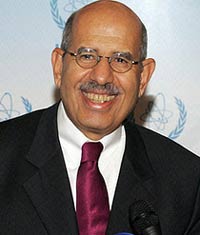|
IAEA, agency chief win Nobel Peace Prize
(AP)
Updated: 2005-10-08 07:33
Mohamed ElBaradei and his International Atomic Energy agency won the 2005
Nobel Peace Prize on Friday, leaving the chief U.N. nuclear inspector
strengthened in a job he nearly lost because of a dispute with the United States
over Iran and Iraq.

Director General of
the International Atomic Energy Agency (IAEA) Mohamed ElBaradei laughs
with tears in his eyes while talking to journalists during a press
conference.[AFP] | ElBaradei suggested winning the
world's most prestigious award vindicated his methods and goals — using
diplomacy rather than confrontation and defusing tensions in multilateral
negotiations that strive for consensus.
He also suggested the conflict with Washington was over, saying Secretary of
State Condoleezza Rice "wished me well" in a congratulatory phone call.
The Bush administration has bristled at ElBaradei's positions on the nuclear
threat posed by Iran and Iraq and unsuccessfully lobbied to block his
appointment to a third and final four-year term this year. The endorsement by
the Nobel committee was viewed as a major boost to the 63-year-old Egyptian and
his mandate to curb nuclear proliferation.
ElBaradei (pronounced ehl-BEHR'-uh-day) and the IAEA locked horns with
Washington in the run-up to the 2003 Iraq war by challenging U.S. claims that
Saddam Hussein possessed weapons of mass destruction. More recently, ElBaradei's
refusal to back U.S. assertions that Iran has a covert nuclear weapons program
hardened opposition to him within the Bush administration.
After the award was announced, ElBaradei refrained from criticizing the
United States in comments to Associated Press Television News and two other
media outlets.
"I don't see it as a critique of the U.S.," he said Friday. "We had
disagreement before the Iraq war, honest disagreement. We could have been wrong,
they could have been right."
|